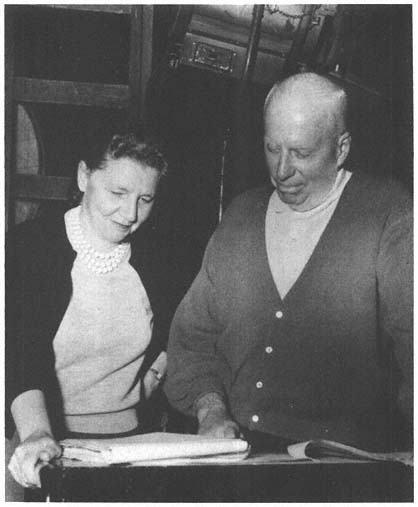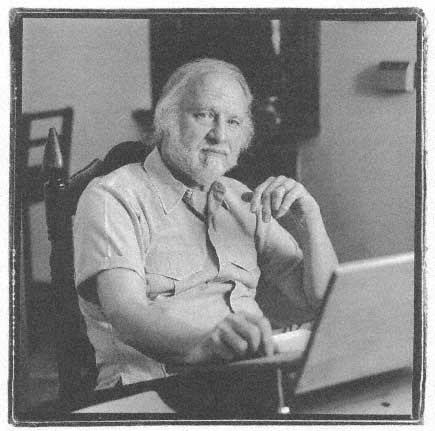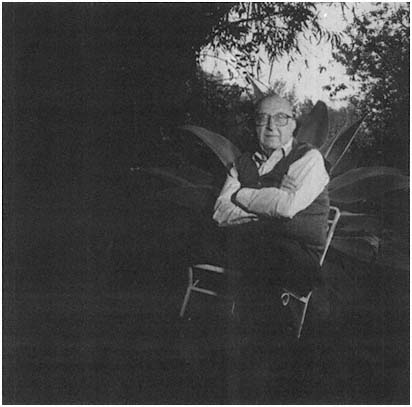Three interviews with pulpsters who would go on to write great movies. These interviews are taken from the University of California Press' Back Stories series.
Leigh Brackett: Journeyman Plumber
Interview by Steve Swires
She wrote that [The Big Sleep] like a man. She writes good.
Howard Hawks, quoted in Hawks on Hawks
 |
| Leigh Brackett with director Howard Hawks at work on Rio Bravo |
Leigh Brackett wrote scripts
for Hawks' The Big Sleep (1946), Rio
Bravo (1959), Hatari! (1962), El
Dorado (1967), and Rio Lobo (1970),
as well as for Robert Altman's The Long Goodbye (1973).
Besides being one of the few successful women screenwriters, she was one of the
earliest successful women science-fiction writers, having entered the field
professionally in 1939. Her best-known character is the larger-than-life
swashbuckling hero Eric John Stark, who first appeared in the pages of Planet
Stories in the 1940s and who returned in a series of novels she wrote
for Ballantine Books.
(This interview was conducted several years before her death
and the posthumous release of The Empire Strikes Back,
her final screen credit.)
This interview doesn't mention it, but she was a mentor of Ray Bradbury. If you haven't read any Brackett yet, a good place to start is her collection of short stories: Black Amazon of Mars: And Other Tales from the Pulps. To read the interview, click here.
From: Backstory 2: Interviews With Screenwriters of the 1940's and 1950's by Patrick McGilligan (Editor)
Richard Matheson: Storyteller
Interview by Pat McGilligan
 |
| Richard Matheson c. 1993 |
Richard Matheson's fan club is a big one, and his name is
familiar to horror, science fiction, and fantasy fans around the world.
In Hollywood permanently since the late 1950s, Matheson is
responsible for classic science fantasy films (The Incredible Shrinking Man,
based on his own first novel), vintage television episodes (fourteen of the
best, early Twilight Zone segments; plus noteworthy contributions to Alfred
Hitchcock Presents, Star Trek, and Night Gallery ); a slew of stylish Edgar
Allan Poe adaptations for the producer-director Roger Corman in the 1960s
(including House of Usher, The Pit and the Pendulum, Tales of Terror, and The
Raven ); and landmark telefilms (Steven Spielberg's breakthrough made-for-TV
feature Duel; The Night Stalker about a vampire in Las Vegas, which won the
Writers Guild Award for Best Television Script; and The Morning After with Dick
Van Dyke as an alcoholic corporate executive).
Matheson wrote quite a few stories for the pulps in the early 1950s. Some of them, together with the best of his early science fiction stories and a few from later collections, are collected in The Best of Richard Matheson. To read the interview, click here.
From: Backstory 3: Interviews with Screenwriters of the 60s edited by Patrick McGilligan
Curt Siodmak:
The Idea Man
Interview by Dennis Fischer
 |
| Curt Siodmak in L.A. c 1989 |
Curt Siodmak is not a name one normally conjures with. He is
noted mainly as the creator of Donovan's Brain, which
spawned three adaptations and countless other uncredited "brain"
movies, and of Larry Talbot, the Wolf Man, eternally part of
the horror folklore created by the famed series of films made by Universal in
the 1930s and 1940s.
Siodmak's pulp credentials are solid - he published Donovan's Brain as a serial in Black Mask in 1942, and had a story in Amazing Stories in 1926. Read the interview here.
From: Backstory 2: Interviews With Screenwriters of the 1940's and 1950's by Patrick McGilligan (Editor)

No comments:
Post a Comment